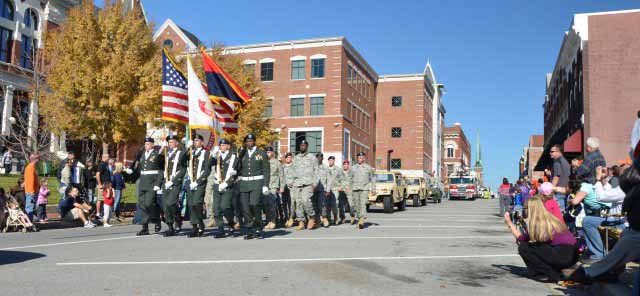
CLARKSVILLE, Tenn. (BP) — Soldiers returning from combat need “soul repair,” Douglas Carver, retired Army Chief of Chaplains, told a Military Ministry Gathering in Clarksville, Tenn., Nov. 17.
“Treat them with dignity and respect because you don’t know what they have gone through,” said Carver, executive director of chaplain services for the North American Mission Board.
Carver joined NAMB earlier this year to cast a vision for future strategy for the mission board’s chaplaincy team, such as plans for developing a partnership between chaplains at nearby Fort Campbell and church and ministry leaders in the Clarksville area.
The Military Ministry Gathering was perhaps the first of its kind to bring together post chaplains, church ministries of various denominations, para-church organizations and other service groups to discuss the needs of the soldiers and their families.
Chaplains can help educate others about how to assist soldiers and their families, said Carver, a retired major general who served as a chaplain at Fort Campbell in the 1980s.
“It’s hard for our troops to come back home because they are searching for meaning and significance,” Carver said, challenging churches to be prepared to help them with that search.
Relationships are one of the most important things soldiers are seeking, Carver pointed out. “They want to tell you their story, but they are not going to tell you their story until they know you are willing to hear it,” he said. “They want to know that you care enough to give them the time to listen.”
The church pew can be a lonely place for a solder, Carver observed. “We need to go to them. We need to connect our troops to the community,” he said, noting, “The power of isolation is very destructive. Troops are isolated from the community.”
Of the approximately 80,000 soldiers and family members stationed at Fort Campbell, only about 25,000 of them live on the installation, said Col. (Chap.) Jeff Houston, Fort Campbell’s chief of chaplains. “The rest of them live out in the community. They live in your community. They sit in your pews,” Houston told approximately 200 participants at the Military Ministry Gathering, held at First Baptist Church in Clarksville.
Carver was a brigade chaplain at Fort Campbell in 1985 when 248 service members from the 101st Airborne Division (Air Assault) died in an aircraft crash in Gander, Newfoundland, while returning from a Sinai peacekeeping mission shortly before Christmas.
In coping with the tragedy, the military “could not have done it without the help of the community,” Carver noted.
“The challenge that is before us now, with the longest war in our nation’s history, is huge,” he said.
Nevertheless, Carver stated, “We can accomplish this mission.”
Churches and other faith organizations know the community and the troops, giving them an advantage for ministry, Carver said. “Much of the nation does not know the military,” he said, “but you do.”
Earlier in the gathering, MG James McConville, commander of Fort Campbell and the 101st Airborne Division (Air Assault), said no other community supports Army families and soldiers like the communities surrounding Fort Campbell.
“It doesn’t get any better than this. We are a hometown team,” McConville said, describing the issues that soldiers face today as a community problem as well as an Army problem.
The 101st Airborne Division has about 50 chaplains and 50 chaplain assistants with more than 20,000 soldiers in seven different brigades.
Those chaplains are ministers in uniform, said LTC (Chap) Jeff Hawkins, division chief of chaplains at the Army base. “We represent character, competence and presence with our soldiers,” he said.
Because of the length of the war in Iraq and Afghanistan and the number of deployments, the emotional and spiritual needs of soldiers and their families are immense, Hawkins said.
“When warriors go do what warriors do, that changes you,” Hawkins said. “Sometimes they don’t know what to do after they have left the war, but the war hasn’t left them.”
Carver said the deployments are “taking a toll on spouses and children. The stress leads to bad behaviors and bad decisions. The soldiers will learn how to manage but they will never get over it.”
Community churches and ministries need to learn about the problems soldiers and their families deal with, Carver said. “Soldiers need to know there is someone they can call at 2 in the morning. It ought not to be that our soldiers are taking their lives because they feel isolated or don’t know who to call,” he said. “We must connect our troops to our community. And that means we have to get to know them and go to them.”
Houston, saying that bridges already exist between the post and the community, noted, “The fact that you are here indicates the bridges are already in place. Our community of faith already has built some bridges.
“The people are the bridge,” Houston said. “The bridge is already built with the people who live in our communities.”
Houston said the chaplains on post understand the needs of soldiers and their families. “We want to begin to share with you that information so you can use it in your organization.” The chaplains plan a followup meeting for Jan. 11 when they will invite community ministry leaders on post to provide a more in-depth understanding of the issues soldiers face as well as insight and resources to help deal with them.
–30–
Frank Wm. White is a deacon and young adults Sunday school teacher at First Baptist Church in Clarksville, Tenn.; a retired Army public affairs officer who served with U.S. Army VII Corps in Operation Desert Storm; and owner of MediaWorks (www.designclarksville.com

















